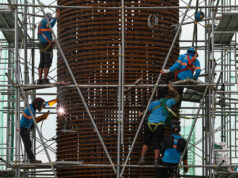Competitiveness council cites top local governments
CITIES and municipalities must undergo digital transformation to efficiently deliver public services and improve competitiveness, according to a summit yesterday of the National Competitiveness Council (NCC), which also released its index that named Quezon City as the most competitive highly urbanized city.

During the fifth Regional Competitiveness Summit at the Philippine International Convention Center (PICC), Guillermo M. Luz, private sector co-chairman of the NCC, said investing in technology and innovation is key to increasing the competitiveness of local government units (LGU) at a time when competition among Southeast Asian nations for investments, trade, jobs and even tourists is shifting to higher gear.
“ICT (information and communication technology) is a crucial enabler for delivering sustainable development at the local and national level by maximizing productivity,” Department of Information and Communications Technology (DICT) Secretary Rodolfo A. Salalima said in a keynote speech during the summit.
“Through automation, we are also improving the efficiency and effectiveness in the delivery of public service.”
The goal, Mr. Luz said, is for entrepreneurs and businesses to be able to file and pay online and for the government to be able to issue license or permits electronically where possible.
“If a city can put its services online or through a phone, we’ll break through,” Mr. Luz said.
“If you want to be competitive, that’s the way to go.”
The summit highlighted the efforts of Makati and Cagayan de Oro to use technology in enhancing public service. Makati was cited as a leader in creating a digitally connected citizenry through several public-private partnerships, while Cagayan de Oro has implemented an online system for assessing and paying taxes, translating to higher revenues for the city.
TOPNOTCHERS
Under the 2017 Cities and Municipalities Competitiveness Index (CMCI), Quezon City emerged as the most competitive overall under the highly urbanized cities category after securing the top spot in infrastructure, and placing second in economic dynamism, government efficiency and resilience.
Joining Quezon City as the most competitive overall were Antipolo under the Component Cities category; Cainta, Rizal among the Class 1-2 municipalities; and Baler, Aurora among Class 3-6 municipalities.
Rizal was named the most competitive province.
The CMCI introduced a new category to recognize LGU efforts to prepare for natural disasters.
The most resilient cities were Davao (among highly urbanized cities) and Bayawan, Negros Oriental (among component cities), while the most resilient municipalities were Cainta, Rizal (Class 1-2) and Mambajao, Camiguin (Class 3-6).
GUIDE
The CMCI is an annual ranking of Philippine cities and municipalities developed by the NCC that can be used as a diagnostic tool by LGUs to assess the competitiveness of their city or municipality against global standards, identify areas for improvement and collaboration, as well as launch reforms and initiatives to further boost competitiveness.
For the business community, the index can serve as a guide for deciding where to locate.
Aside from the overall score, data on the various indicators could prove helpful, depending on the specific needs of the inquiring business.
The latest edition of the CMCI covered 91% or 1,487 cities and municipalities — the highest participation on record — out of 1,634 local governments in the Philippines.
Coverage has been growing since 2013 when only 285 cities and municipalities formed part of the index.
The increasing coverage of the index signifies a higher level of awareness among LGUs of the importance of being measured against specific pillars and their stronger commitment to improve performance.
Moreover, the Philippine Business Data Bank — a Web-based application that enables government agencies to access data on a particular business — was launched at the summit.
The initiative serves as a quick “Yellow Page” of businesses, enabling the public to verify the legitimacy of customers, vendors and other businesses. The data bank is currently in testing phase and will officially go live on Nov. 30. — Krista Angela M. Montealegre



